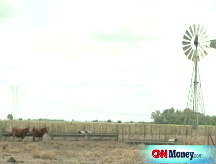Hopeful signs for agri-business
Recession aside, global grain demand is likely to double by 2030, boosting long-term prospects for the ag sector. Syngenta hopes to profit from that.
NEW YORK (Fortune) -- Given the doom and gloom in much of the commodities world, Syngenta CEO Michael Mack seems awfully chipper.
And why not? A Swiss agricultural products company, Syngenta's 2008 earnings were up 25%, to nearly $1.4 billion. Its stock price (SYT) may be down 25% over the past 12 months but that's still 20 percentage points better than the S&P 500. Syngenta had no trouble selling $300 million in bonds last November despite the nightmarish credit market. And even with the rest of the global economy in recession, Mack remains hopeful about the agricultural sector in general and his own company's 2009 earnings in particular.
"We think we'll have positive income growth," says the 48-year-old Mack, one of only a handful of Americans running a major European company. "The fundamentals in agriculture are still intact."
For Mack, those fundamentals can be boiled down to one statistic: Global grain demand is likely to double by 2030, given world population growth and the trend towards urbanizations. (Middle-class city-dwellers tend to have "bigger and better diets," Macy says.) "You're talking about adding a couple billion people." And with little arable land not being farmed already, farmers will need the high-tech seeds, pesticides and herbicides that comprise Syngenta's core business in order to keep their crop yields growing.
Mack reports that sales of seeds and pesticides remain strong in the Midwest breadbelt ("business as usual"), though he does see weakness in Brazil and in Eastern European countries like Ukraine whose currencies have been battered.
What about the current struggles of the ethanol business? A Detroit native, Mack acknowledges that it's hard to turn a profit making ethanol, with gasoline at $1.90 a gallon and corn at $3.65 a bushel. A few years ago those numbers were reversed, prompting an investing binge in new ethanol plants. Now some of those plants are being shuttered.
Mack expects oil prices to rebound once the economy gets back on track. In the meantime, Syngenta is marketing a genetically-modified corn seed bestowed with an enzyme known as amylase that makes the corn-to-ethanol distilling process 10% more efficient. Says Mack, "I wouldn't write off corn-to-ethanol at all as a viable industry." ![]()
-
 The retail giant tops the Fortune 500 for the second year in a row. Who else made the list? More
The retail giant tops the Fortune 500 for the second year in a row. Who else made the list? More -
 This group of companies is all about social networking to connect with their customers. More
This group of companies is all about social networking to connect with their customers. More -
 The fight over the cholesterol medication is keeping a generic version from hitting the market. More
The fight over the cholesterol medication is keeping a generic version from hitting the market. More -
 Bin Laden may be dead, but the terrorist group he led doesn't need his money. More
Bin Laden may be dead, but the terrorist group he led doesn't need his money. More -
 U.S. real estate might be a mess, but in other parts of the world, home prices are jumping. More
U.S. real estate might be a mess, but in other parts of the world, home prices are jumping. More -
 Libya's output is a fraction of global production, but it's crucial to the nation's economy. More
Libya's output is a fraction of global production, but it's crucial to the nation's economy. More -
 Once rates start to rise, things could get ugly fast for our neighbors to the north. More
Once rates start to rise, things could get ugly fast for our neighbors to the north. More








